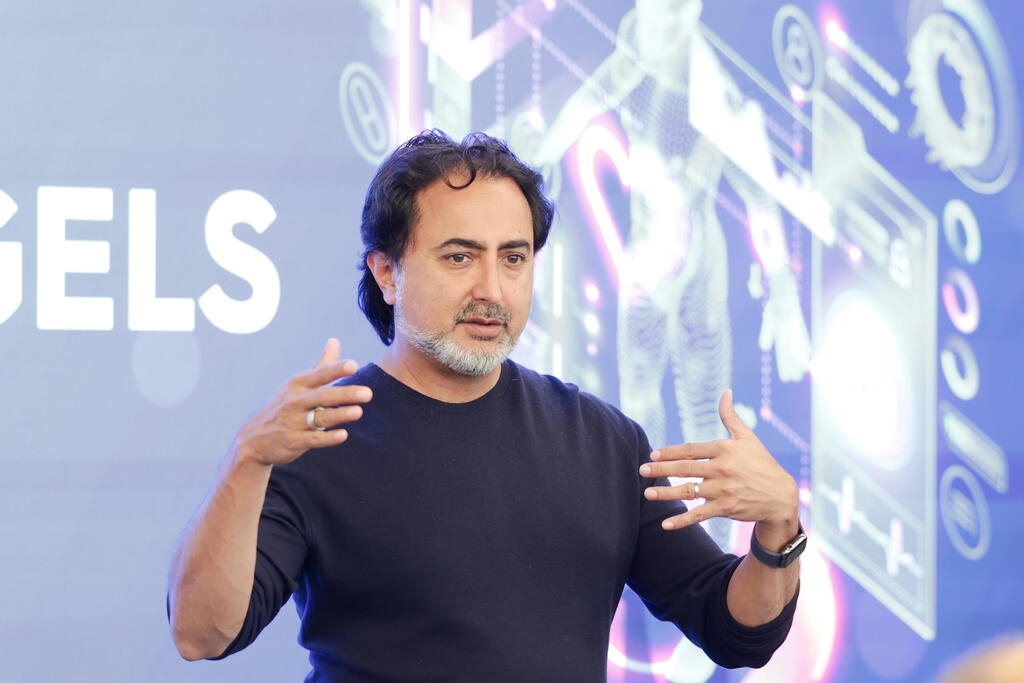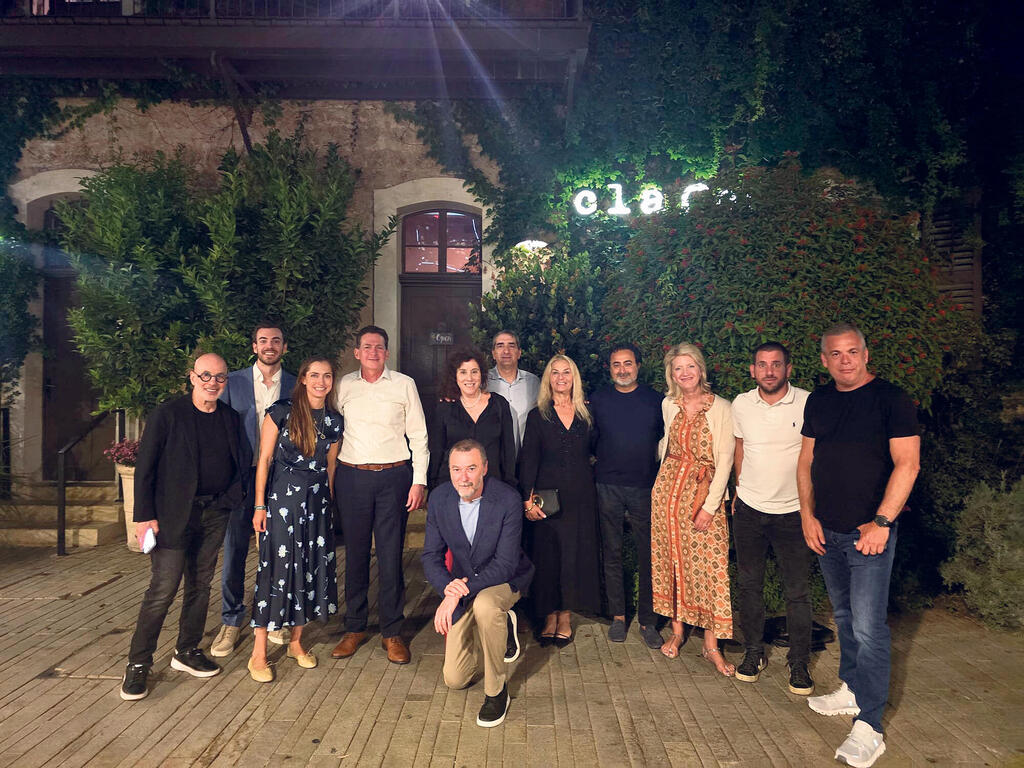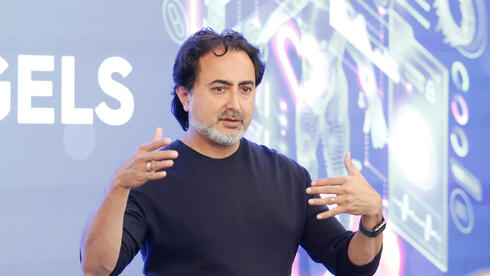“I always think bubbles are good. Bubbles are good because they mobilize capital and talent into new vectors of innovation. You’re seeing some companies being extraordinarily priced, but the business validation isn’t there. But then there are some companies that are just truly growing at extraordinary rates, so their valuations are high, and it’s happening fast,” says Hemant Taneja, CEO of VC giant General Catalyst, providing a surprisingly optimistic perspective on AI, as well as a lack of concern about the bubble developing around it, as even Sam Altman of OpenAI and other Silicon Valley executives have recently expressed.
Taneja is one of the most senior and well-known figures in the American venture capital industry and beyond. He is also considered an expert in AI, having invested in all the hot names from Anthropic to Mistral, as well as in the Israeli company Aidoc. He is the author of the 2018 book Unscaled: How AI and a New Generation of Upstarts Are Creating the Economy of the Future, which examines how AI could enable hyper-personalization across all areas of life, with a particular focus on health.
2 View gallery


Hemant Taneja
(Orel Cohen)
The exclusive interview with him, the first ever for Israeli media, takes place at Sheba Hospital, where General Catalyst collaborates with the hospital’s ARC Innovation Center. The agreement was signed in the summer of 2023, just before the outbreak of the war in Israel, but Taneja seems largely unbothered by the local situation. In the middle of the interview, news arrives about a drone launch from Yemen, yet he remains composed and continues discussing AI, Israel, and the fund’s investments, as if also in Silicon Valley, drones occasionally fly overhead not as part of an experimental technology project.
The visit also included meetings with entrepreneurs from General Catalyst’s portfolio, with the VC recently participating in fundraising rounds for companies such as Armis and Aidoc. Taneja also used the trip to meet promising new companies, connect with investors, and attend the wedding of venture capitalist Zach Frankel in Jerusalem, which brought together top names in the American investment industry. During the busy, crowded three-day visit, Taneja even managed to meet local angels, usually the ones seeking meetings, who were eager to hear him speak for fifteen minutes. Among them were Avishai Abrahami, founder and CEO of Wix; Yossi Vardi, a senior local industry figure; and Marius Nacht, one of the founders of Check Point, who now focuses mainly on healthcare investments.
When asked why a fund like General Catalyst, which has access to every startup on Earth, would invest in Israel, a country that has been at war for two years and faces a challenging international image, Taneja replied: “Israel is a really amazing country in that regard, where adversity only makes the entrepreneurs more resilient and more wanting to win. So, in some ways, when I talk to the founders here, I feel like they’re as determined as ever, if not more. The quality of what is being built today is as good as it ever was. If anything, you have a lot more problems and opportunities to address in the world. So, it’s actually a fertile time to be investing, and entrepreneurship is in the country’s blood here. It’s a very entrepreneurial culture overall.”
Does the geopolitical situation not concern the fund?
“I think geopolitical situations actually motivate us to invest here and in other markets that we’ve always invested in. Our view is based on our thesis around global resilience, where every region in critical industries needs to build its own local capabilities. This includes healthcare, energy, defense, industrials, and cyber. So, our view is, can we empower and help entrepreneurs build market-leading companies in their geographies that address those issues? It’s actually, and we do business in the US, Europe, Israel, and India, and in all those markets, we’re looking for folks that are building companies in these industries to help scale them.”
But you’re not opening an office in Israel.
“We don’t have an office here, but we support investment activity in Israel with the help of our teams in the U.S. and Europe.”
Will you invest in more companies in Israel?
“Absolutely, we have invested here for a long time. From a venture capital industry perspective, we are one of the larger investors in terms of how much capital we’ve invested here. We are meeting some new companies as well. We’ve always enjoyed meeting the founders here. They think global in their ambitions. We have some amazing companies here, you know, Melio and Lemonade and Rapyd and Deal. We have many really, really interesting businesses here. And we want to do more, so that’s why we’re here.”
You don’t mention AI in the context of Israel. Do you agree with the view that there is less happening here in that area right now?
“I just had lunch with many of our founders, and they felt the same, that Israel, from an AI infrastructure perspective, has not done much. Having said that, in the application of AI into businesses, cyber and defense, healthcare, and other sectors, there’s a lot going on here. So, on the infrastructure side, you’re not seeing a lot, which has been a surprise for me. I thought there would be more. But on the application side, everybody’s needing it, and many topics over lunch were about how founders are using AI to help their existing teams do a lot more with them. You can really scale businesses much more effectively from a human capital perspective, and that is happening on the ground here pretty effectively.”
So by infrastructure, you mean large language models?
“Yeah. I think the evolution of language models, you don’t have those AI labs here. Most of that is obviously in the U.S. Europe’s got some, India is now doing some, and I actually think Singapore’s done some work in that regard now as well. But Israel, I have not seen that.”
The AI Revolution in Healthcare
Taneja, 50, a native of India who moved to the U.S. and earned five academic degrees at MIT, began his career as an entrepreneur. He co-founded the digital health company Livongo, which was sold to telemedicine giant Teladoc for $18.5 billion, the largest exit in the sector, and later co-founded another company that was sold after reaching a $6 billion valuation.
Since 2021, he has led the giant General Catalyst fund, one of the largest and oldest in the U.S. Once a firm focused on early-stage startups, backing companies like Snapchat and Airbnb, it has, under Taneja’s leadership, taken unprecedented steps that he himself defines as turning it into a “conglomerate.”
The fund manages $27 billion. Its most recent raise was $8 billion at the end of 2024. In early 2025, General Catalyst also established a wealth management arm for high-net-worth clients. Even earlier, it acquired the Summa Health hospital chain in the U.S. to apply AI technologies and showcase the transformation possible in healthcare through artificial intelligence. In short, it is no longer just a venture capital fund. Alongside other giants such as Sequoia, General Catalyst is at the forefront of a trend in which VC firms are moving beyond their original model, driven both by a tough IPO market and the massive capital required to finance the AI revolution.
It seems that after your career as a writer and entrepreneur, you grew tired of being “just” in a VC fund and decided to invent new activities.
“Yes, I sold a few companies,” he smiles modestly, as though they weren’t worth billions. “To me, GC is a company, and I very much view myself still as an entrepreneur. In fact, the culture at GC is always described as entrepreneurial. We want to help other entrepreneurs build companies to drive transformations, but that’s our business. We are a business in that regard. So, I have never viewed it as, ‘I’m a pure investor; I’m a pure builder.’ Investing is just part of how we build, is the way I think about it.”
2 View gallery


Hemant Taneja met many senior Israeli executives during his visit to the country.
(Photo: ARC)
You wrote the guidebook on applying AI to medicine back in 2018, when AI was still largely theoretical. What unfolded differently than you expected?
“I wrote “Unscaled” in 2018. The observation I made was that because of the cloud, mobile, and social, we’re essentially recreating society online – content, community, commerce, care – all the core capabilities. Because we were collecting so much data about each person, we were moving from an era of mass production to mass personalization. This was before transformer technology really took hold and ChatGPT happened, but it was on the cusp. We were thinking, if we’re truly going to an era of mass personalization, what does it mean for society, and how do different sectors change? Obviously, the sector I focused most on was healthcare because we were already building companies in that domain. A lot of that has played out. Over the last seven years, things have only accelerated. AI has a lot to do with this, but there are other technologies taking hold like crypto and life sciences. It’s an exciting road ahead, and one where we need to be intentional about how we adopt AI, especially in sectors like healthcare, where it impacts people’s lives. It’s a really exciting time to be doing what we do because we get to build a future.”
These are ambitious theories, but what is happening in practice, for example, in the hospital you acquired in that unusual move?
“We have been working with health insurance and health system partners, which is what we call our health insurance partners, for about five plus years. Our whole theory was that we would create an ecosystem of companies that together can help transform the hospital to be proactive, affordable, and accessible. This ecosystem of companies uses AI and technology to transform different parts of the hospitals: payments, patient experience, workforce, everything we talked about. We’ve been down that path, and we decided that to create the blueprint, it would be really effective and accelerate our timing of transformation if we just owned one. So, that’s when we decided to go buy one. We did not buy it out of our funds because we don’t want the limitations of fund duration, so it’s not part of the portfolio. We’re trying to say what are the best solutions, bring them in, interoperate them using AI technology so that we can drive that transformation. We have mapped out 120 projects that we’re going to do once we start working with them at the end of September, like Aidoc, that are all moving towards that transformation.”
According to Taneja, the healthcare sector has been hit by two “black swan” events: first the coronavirus, which exposed systemic problems, and then artificial intelligence. “At Sheba Hospital, they think the same way, and a lot of the work we’ve been doing in the U.S., Sheba, through its ARC platform, has been doing globally. We actually have some overlapping health systems where we are both actively engaged in the U.S., and we also have several companies, some Sheba has helped start, some we’ve helped start, that are all part of the solution for this transformation. As we think about the next phase of our partnership, we’re considering what that playbook for transformation is that we’re both developing and how it can converge to be effective.”
The ARC Innovation Center was established in 2019 by Sheba CEO Prof. Yitshak Kreiss and Chief Transformation, Innovation and AI Officer Eyal Zimlichman to promote digital medical innovation at the hospital. It allows entrepreneurs to test their developments in-house and fosters strategic partnerships with hospitals abroad. One of its best-known successes is unicorn Aidoc, which developed an AI-powered engine for scanning X-rays and CTs to provide real-time alerts to doctors. About a month ago, General Catalyst led a $150 million fundraising for Aidoc, with AI chip giant Nvidia also participating.
“It’s not a given that the CEO of one of the world’s largest investment funds comes to Israel and specifically to ARC, and that alongside traditional investments in cyber and defense, he takes an interest in a hospital,” Kreiss told Calcalist. “Successful startups are not just the result of a brilliant idea or a lone entrepreneur, but of a culture of innovation and managerial attention. This environment has already produced two major exits totaling about $1 billion, Belkin Vision and Innovalve, and our current portfolio is valued at $6 billion.”

